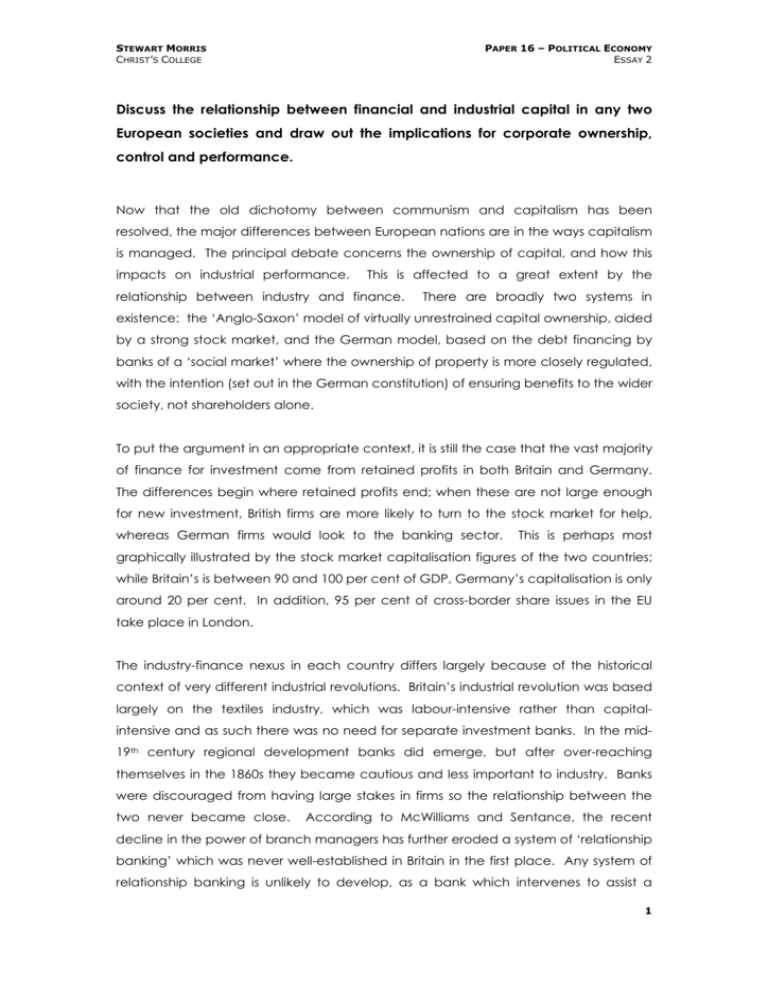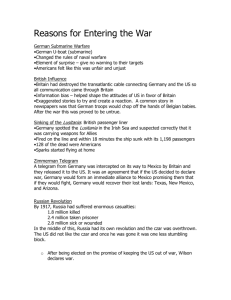Discuss the relationship between financial and
advertisement

STEWART MORRIS CHRIST’S COLLEGE PAPER 16 – POLITICAL ECONOMY ESSAY 2 Discuss the relationship between financial and industrial capital in any two European societies and draw out the implications for corporate ownership, control and performance. Now that the old dichotomy between communism and capitalism has been resolved, the major differences between European nations are in the ways capitalism is managed. The principal debate concerns the ownership of capital, and how this impacts on industrial performance. This is affected to a great extent by the relationship between industry and finance. There are broadly two systems in existence: the ‘Anglo-Saxon’ model of virtually unrestrained capital ownership, aided by a strong stock market, and the German model, based on the debt financing by banks of a ‘social market’ where the ownership of property is more closely regulated, with the intention (set out in the German constitution) of ensuring benefits to the wider society, not shareholders alone. To put the argument in an appropriate context, it is still the case that the vast majority of finance for investment come from retained profits in both Britain and Germany. The differences begin where retained profits end; when these are not large enough for new investment, British firms are more likely to turn to the stock market for help, whereas German firms would look to the banking sector. This is perhaps most graphically illustrated by the stock market capitalisation figures of the two countries; while Britain’s is between 90 and 100 per cent of GDP, Germany’s capitalisation is only around 20 per cent. In addition, 95 per cent of cross-border share issues in the EU take place in London. The industry-finance nexus in each country differs largely because of the historical context of very different industrial revolutions. Britain’s industrial revolution was based largely on the textiles industry, which was labour-intensive rather than capitalintensive and as such there was no need for separate investment banks. In the mid19th century regional development banks did emerge, but after over-reaching themselves in the 1860s they became cautious and less important to industry. Banks were discouraged from having large stakes in firms so the relationship between the two never became close. According to McWilliams and Sentance, the recent decline in the power of branch managers has further eroded a system of ‘relationship banking’ which was never well-established in Britain in the first place. Any system of relationship banking is unlikely to develop, as a bank which intervenes to assist a 1 STEWART MORRIS CHRIST’S COLLEGE PAPER 16 – POLITICAL ECONOMY ESSAY 2 customer in difficulties will have its seniority as a debtor reduced, and this creates a strong disincentive to intervene. The British stock market developed at the end of the 19th century. Access to the stock market was made easy from a legal point of view, so it became widely used within a very short time period but, due to a lack of good information on the quality of equity, long-term loans were rarely forthcoming. This has been blamed for fostering a culture of short-termism among managers, as well as promoting hostile takeovers and failing to encourage rationalisation. Germany on the other hand had a much faster industrial revolution, which began in the mid-19th century. The major industries were heavy ones such as iron and steel, and later chemicals and automobiles, which needed large amounts of start-up capital to succeed. Appropriate banks for investment were deliberately set up by government in the 1870s to accumulate the deposits of small savers and invest them in local industry. This developed into the concept of the Hausbank or ‘House Bank’, still in existence today, which combines the features of a British-style commercial bank and a British-style investment bank. A consequence of this is that banks had some time to develop industrial expertise, as they were often represented on a second board of directors in firms, known as a supervisory board. Banks were especially prominent where capital requirements were particularly high, and often acquired ownership of particular firms when those firms faced financial difficulties. Growth tended to be internal rather than external, though when a takeover did occur, banks tended to insist on post-merger rationalisation. The legal system developed to favour banks, and the growth of the stock market was stunted. To a large extent the system has not changed much today. In Britain the stock market dominates more than ever before, while despite the recent development of the Frankfurt stock market, Germany retains its system of finance primarily through the banking sector. This has had important implications for the ownership and control of firms. In Britain the owners (i.e. the shareholders) consist mainly of fund managers for financial institutions such as pension companies, accounting for 58% of all investments by value compared to only 15% in Germany. These fund managers have few direct relations with managers; Prevezer and Ricketts say that investors are actively encouraged to be ‘outsiders’. There has been very limited development of an ‘ownership psychology’ among shareholders, characterised by a minimal commitment to particular firms. Investment fund managers, who account for over half of all British shareholdings, are extremely careful with their money and will always seek to move capital to firms which give the highest returns. Ownership is highly 2 STEWART MORRIS CHRIST’S COLLEGE PAPER 16 – POLITICAL ECONOMY ESSAY 2 dispersed to shed risk, and most single investments are less than 10% of a firm. Under British company law it is necessary to make an outright bid for a company when a 30% ownership has been achieved, compared to 50% in Germany. This means shareholders are put off having large holdings in individual companies as this would include a large risk element which, as has already been mentioned, is anathema to prudent fund managers. Insider trading legislation, only introduced very recently in Germany, has also historically prevented individual investors from acquiring major shares. The stock market has generally eliminated family ownership and control, and there is a very limited amount of cross-shareholding by companies. Control by owners has become primarily external and indirect, giving a great deal of autonomy and power to chief executives. Bank membership of company boards is frowned upon, as banks are not considered to possess the necessary industrial expertise to make decisions at management level. The direct monitoring by banks seen in the German system is replaced by the threat of takeover, which is easily carried out under British company law. In Germany, ownership and control is much more highly concentrated. 90% of all German companies have owners who possess over 10% of the firm. Family ownership has been preserved to a much greater extent than in Britain, and there is a more developed ‘ownership psychology’. Cross-ownership is common. Firms in Germany appear more willing to consider the interests of all of their stakeholders. In a survey of managers’ perceptions of their firms by Schneider-Lenné, British managers tended to define their success in terms of profits, returns on investment, price-earnings ratios and shareholder value, while German managers would instead emphasise products, turnover, market share and number of employees. This might be described as ‘production-oriented capitalism’, as opposed to the ‘finance-oriented’ Anglo-Saxon model. Rules on the disclosure of information have led to the dominance of accountants in British companies, compared to German companies where, for example, engineers and scientists are more strongly represented. In a separate survey by Woolcock, 90% of 200 top British managers considered the City to be ‘shorttermist’. This short-termism is dangerous as the high dividends necessary for survival in the City divert funds away from training and from research and development. Ownership interests in Germany are largely checked by employee representation on the supervisory boards, and German managers seem to take more pride in social provision for their employees. Market discipline is much weaker than in Britain. Banks may step in to prevent a hostile takeover, and as such this type of acquisition is rare in Germany. Legal barriers to transfer control exist, and this supports companies which 3 STEWART MORRIS CHRIST’S COLLEGE PAPER 16 – POLITICAL ECONOMY ESSAY 2 in a more open system would be taken over. For example, German companies are allowed to issue non-voting shares to an amount equal to that of voting shares, allowing companies to achieve equity without the surrender of control. The largest owners of firms in Germany are non-financial institutions, consisting mainly of other firms. These differences in ownership and control are bound to impact on the relative industrial performance of the two countries. In Britain, the stockmarket domination leads to a free and flexible capital market, with high financial transparency and high liquidity. In theory, savings should be allocated to the most efficient users of capital, though there are still information deficiencies, for example in the long-term prospects of high-tech firms. Takeover and reward mechanisms should reliably reward the most efficient users of capital, but there have been suggestions by commentators such as Will Hutton that this may have been achieved at the expense of social efficiency. What is in very little doubt is that the British stock market has had knock-on effects into a lively market in venture capital, and that it continues to attract the vast majority of international investors and dealers in Europe. However, critics have claimed that the City encourages short-termism in investment, fixed capital and human resource development. Reinvestment is lower in Britain than in Germany, we have much less emphasis on training and a shortage of world-class firms in many major industries. There may have been a negative impact on employee commitment, especially at the managerial level, where managers who have achieved short-term aims find it easy to move between firms. Due in part to the lack of cross-holding of shares, firms have also become atomistic and are less likely to cooperate with each other, for example to reorganise an industrial sector. Derek Morris suggests that the stock market does not provide an especially strong, effective or efficient way of disciplining poor managerial performance or for creating incentives to correct it, as the monitoring is based primarily upon short-term financial results and unsubstantiated speculation about future performance. Conyon and Peck develop this argument by talking about the principal-agent problem, whereby the principals (shareholders) have imperfect information about the activities of the agents (managers), and this prevents the establishment of an appropriate reward structure. Statistical analysis by the same team does not suggest any proven relationship between rewards and performance. Many shareholders do not attempt to monitor the activities of managers as this monitoring can be seen as a public good – there is a temptation to free-ride on the monitoring of other shareholders, and as such, no single shareholder will commit to doing the job themselves. In addition, there is no a priori basis for 4 STEWART MORRIS CHRIST’S COLLEGE PAPER 16 – POLITICAL ECONOMY ESSAY 2 asserting that pension fund managers will be any good at running a company. This is not the case in Germany, where the major shareholder (often a bank) tends to own a much larger proportion of the firm, and these shareholders come from groups with some experience of the industry. Finally, investors and acquisitors (particularly the latter) make regular valuation errors, and over-optimistic valuations often lead to takeovers which have a zero or negative effect on managerial performance. In the German system, managers are able to take a longer-term view. Firms may benefit from banks’ knowledge of the wider industry, with bank managers acting as management consultants (but without the cost). The accountability of managers is greater in the German system, as they are far more carefully supervised, and owners of businesses are able to exert greater control. Firms are often protected from hostile takeover, and this prevents excessive concern about purely financial, short-term, measures of success. On the negative side, banks are often seen in Germany as too powerful, and there is a persistent concern that this power might be abused. Banks can vote on supervisory boards on behalf of smaller voters. They dominate the capital markets, as borrowers, lenders, advisors and stockbrokers. however to over-emphasise the role of banks in Germany. It is tempting Although they own roughly four times the percentage of all shares that their British equivalents do, this figure is still under 10%. This can be compared with the 40% of shares owned by nonfinancial institutions (i.e. other companies in a cross-holding system), while the equivalent figure for cross-holdings in Britain is only 5%. The top three German banks own holdings equivalent to only 14% of the domestic economy, compared to 18% in Britain. Banks hold only 9.1% of supervisory board mandates, compared to 12.5% held by trade union functionaries and 25.8% held by representatives of other firms. In this perspective, businesses prefer banks to have power on the supervisory boards, as they are seen as playing a more supportive role than the other two major interest groups. Another defense against this is that there is a lot of competition between banks in Germany, so the argument may have been overstated. It is also argued though that banks impede innovation by reducing capital transfer to risky firms – the suggestion is that banks may be good at allowing incremental innovations, but do not generally support radical innovation. This argument seems peculiar in the light of the number of successful high-tech companies in Germany today. Another suggestion is that the venture capital market has remained underdeveloped due to the relative backwardness of the German stock market. Possibly the most common argument from the defenders of the unfettered Anglo-Saxon system is that German banks destroy competition. This may have an element of truth in it, but on the other 5 STEWART MORRIS CHRIST’S COLLEGE PAPER 16 – POLITICAL ECONOMY ESSAY 2 hand they do prevent the ‘raider capitalism’ seen in Britain, where hostile takeovers occur regularly but are not necessarily followed by rationalisation. The continued integration of Europe may cause some convergence in the financial systems of the two countries. Common regulatory standards are being established as the stock markets of both Britain and Germany continue to expand and modernise. One might expect that with the apparent success of German industry, Britain might converge towards the German system, rather than the other way round. However, finance is increasingly internationalised, and there is a fear among proponents of the German system that international capital (particularly from the USA) will simply move to wherever it generates the highest returns. Jonathan Story claims that because of this, only flexible and open financial systems (such as those of Britain and the USA) will be able to persist in the long term. Foreign direct investment in Britain is much higher as a proportion of GDP than it is in Germany (approximately 4% and 1% respectively). Convergence may have been over-stated though. The German stock market has a very long way to go before it achieves the same capitalisation as the British one. Germany appears to be quite content with its company law, which it sees as a prerequisite for long-term, stable growth. Britain appears to be content with its own law, at least in legal, managerial and governmental circles, where social provision is generally seen as a threat to competitiveness. Convergence may not come quickly if the European Union is stuck in an impassé over legislation. Despite the apparent benefits of the German model for the long-term support of industry, it appears that in an increasingly globalised world, such a model will not be extended to Britain. 6









